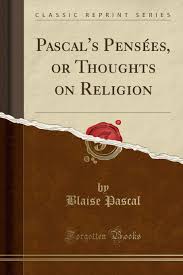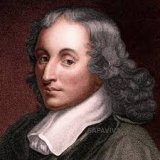Pensées Page #3
The Pensées is a collection of fragments on theology and philosophy written by 17th-century philosopher and mathematician Blaise Pascal. Pascal's religious conversion led him into a life of asceticism, and the Pensées was in many ways his life's work. The Pensées represented Pascal's defense of the Christian religion.
I have said above that Pascal's method is "on the whole" that of the typical Christian apologist; and this reservation was directed at Pascal's belief in miracles, which plays a larger part in his construction than it would in that, at least, of the modern liberal Catholic. It would seem fantastic to accept Christianity because we first believe the Gospel miracles to be true, and it would seem impious to accept it primarily because we believe more recent miracles to be true; we accept the miracles, or some miracles, to be true because we believe the Gospel of Jesus Christ: we found our belief in the miracles on the Gospel, not our belief in the Gospel on the miracles. But it must be remembered that Pascal had been deeply impressed by a contemporary miracle, known as the miracle of the Holy Thorn: a thorn reputed to have been preserved from the Crown of Our Lord was pressed upon an ulcer which quickly healed. Sainte-Beuve, who as a medical man felt himself on solid ground, discusses fully the possible explanation of this apparent miracle. It is true that the miracle happened at Port-Royal, and that it arrived opportunely to revive the depressed spirits of the community in its political afflictions; and it is likely that Pascal was the more inclined to believe a miracle which was performed upon his beloved sister. In any case, it probably led him to assign a place to miracles, in his study of faith, which is not quite that which we should give to them ourselves. Now the great adversary against whom Pascal set himself, from the time of his first conversations with M. de Saci at Port-Royal, was Montaigne. One cannot destroy Pascal, certainly; but of all authors Montaigne is one of the least destructible. You could as well dissipate a fog by flinging hand-grenades into it. For Montaigne is a fog, a gas, a fluid, insidious element. He does not reason, he insinuates, charms, and influences; or if he reasons, you must be prepared for his having some other design upon you than to convince you by his argument. It is hardly too much to say that Montaigne is the most essential author to know, if we would understand the course of French thought during the last three hundred years. In every way, the influence of Montaigne was repugnant to the men of Port-Royal. Pascal studied him with the intention of demolishing him. Yet, in the Pensées, at the very end of his life, we find passage after passage, and the slighter they are the more significant, almost "lifted" out of Montaigne, down to a figure of speech or a word. The parallels[A] are most often with the long essay of Montaigne called Apologie de Raymond Sébond--an astonishing piece of writing upon which Shakespeare also probably drew in Hamlet. Indeed, by the time a man knew Montaigne well enough to attack him, he would already be thoroughly infected by him. [A] Cf. the use of the simile of the couvreur. For comparing parallel passages, the edition of the Pensées by Henri Massis (A la cité des livres) is better than the two-volume edition of Jacques Chevalier (Gabalda). It seems just possible that in the latter edition, and also in his biographical study (Pascal; by Jacques Chevalier, English translation, published by Sheed & Ward), M. Chevalier is a little over-zealous to demonstrate the perfect orthodoxy of Pascal. It would, however, be grossly unfair to Pascal, to Montaigne, and indeed to French literature, to leave the matter at that. It is no diminution of Pascal, but only an aggrandisement of Montaigne. Had Montaigne been an ordinary life-sized sceptic, a small man like Anatole France, or even a greater man like Renan, or even like the greatest sceptic of all, Voltaire, this "influence" would be to the discredit of Pascal; but if Montaigne had been no more than Voltaire, he could not have affected Pascal at all. The picture of Montaigne which offers itself first to our eyes, that of the original and independent solitary "personality," absorbed in amused analysis of himself, is deceptive. Montaigne's is no limited Pyrrhonism, like that of Voltaire, Renan, or France. He exists, so to speak, on a plan of numerous concentric circles, the most apparent of which is the small inmost circle, a personal puckish scepticism which can be easily aped if not imitated. But what makes Montaigne a very great figure is that he succeeded, God knows how--for Montaigne very likely did not know that he had done it--it is not the sort of thing that men can observe about themselves, for it is essentially bigger than the individual's consciousness--he succeeded in giving expression to the scepticism of every human being. For every man who thinks and lives by thought must have his own scepticism, that which stops at the question, that which ends in denial, or that which leads to faith and which is somehow integrated into the faith which transcends it. And Pascal, as the type of one kind of religious believer, which is highly passionate and ardent, but passionate only through a powerful and regulated intellect, is in the first sections of his unfinished Apology for Christianity facing unflinchingly the demon of doubt which is inseparable from the spirit of belief. There is accordingly something quite different from an influence which would prove Pascal's weakness; there is a real affinity between his doubt and that of Montaigne; and through the common kinship with Montaigne Pascal is related to the noble and distinguished line of French moralists, from La Rochefoucauld down. In the honesty with which they face the données of the actual world this French tradition has a unique quality in European literature, and in the seventeenth century Hobbes is crude and uncivilised in comparison. Pascal is a man of the world among ascetics, and an ascetic among men of the world; he had the knowledge of worldliness and the passion of asceticism, and in him the two are fused into an individual whole. The majority of mankind is lazy-minded, incurious, absorbed in vanities, and tepid in emotion, and is therefore incapable of either much doubt or much faith; and when the ordinary man calls himself a sceptic or an unbeliever, that is ordinarily a simple pose, cloaking a disinclination to think anything out to a conclusion. Pascal's disillusioned analysis of human bondage is sometimes interpreted to mean that Pascal was really and finally an unbeliever, who, in his despair, was incapable of enduring reality and enjoying the heroic satisfaction of the free man's worship of nothing. His despair, his disillusion, are, however, no illustration of personal weakness; they are perfectly objective, because they are essential moments in the progress of the intellectual soul; and for the type of Pascal they are the analogue of the drought, the dark night, which is an essential stage in the progress of the Christian mystic. A similar despair, when it is arrived at by a diseased character or an impure soul, may issue in the most disastrous consequences though with the most superb manifestations; and thus we get Gulliver's Travels; but in Pascal we find no such distortion; his despair is in itself more terrible than Swift's, because our heart tells us that it corresponds exactly to the facts and cannot be dismissed as mental disease; but it was also a despair which was a necessary prelude to, and element in, the joy of faith.
Translation
Translate and read this book in other languages:
Select another language:
- - Select -
- 简体中文 (Chinese - Simplified)
- 繁體中文 (Chinese - Traditional)
- Español (Spanish)
- Esperanto (Esperanto)
- 日本語 (Japanese)
- Português (Portuguese)
- Deutsch (German)
- العربية (Arabic)
- Français (French)
- Русский (Russian)
- ಕನ್ನಡ (Kannada)
- 한국어 (Korean)
- עברית (Hebrew)
- Gaeilge (Irish)
- Українська (Ukrainian)
- اردو (Urdu)
- Magyar (Hungarian)
- मानक हिन्दी (Hindi)
- Indonesia (Indonesian)
- Italiano (Italian)
- தமிழ் (Tamil)
- Türkçe (Turkish)
- తెలుగు (Telugu)
- ภาษาไทย (Thai)
- Tiếng Việt (Vietnamese)
- Čeština (Czech)
- Polski (Polish)
- Bahasa Indonesia (Indonesian)
- Românește (Romanian)
- Nederlands (Dutch)
- Ελληνικά (Greek)
- Latinum (Latin)
- Svenska (Swedish)
- Dansk (Danish)
- Suomi (Finnish)
- فارسی (Persian)
- ייִדיש (Yiddish)
- հայերեն (Armenian)
- Norsk (Norwegian)
- English (English)
Citation
Use the citation below to add this book to your bibliography:
Style:MLAChicagoAPA
"Pensées Books." Literature.com. STANDS4 LLC, 2024. Web. 22 Dec. 2024. <https://www.literature.com/book/pens%C3%A9es_114>.




Discuss this Pensées book with the community:
Report Comment
We're doing our best to make sure our content is useful, accurate and safe.
If by any chance you spot an inappropriate comment while navigating through our website please use this form to let us know, and we'll take care of it shortly.
Attachment
You need to be logged in to favorite.
Log In